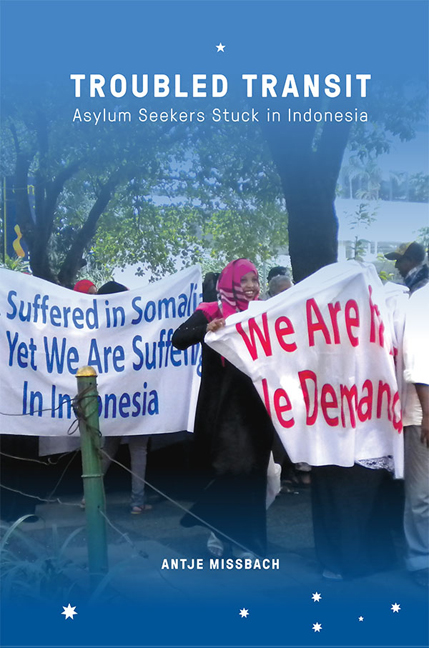Book contents
- Frontmatter
- Contents
- List of tables
- Acknowledgements
- Map of Indonesia
- Acronyms and Initialisms
- 1 Introduction
- 2 Transiting Indonesia: Past and Present
- 3 The Politics of Detention
- 4 Life on Hold
- 5 The Limits of Protection
- 6 Indonesia as a Transit State: Obligations, Policies, and Practice
- 7 Tidal Ebb and Flow: The Indonesia-Australia Relationship
- 8 Selling Hope
- 9 Conclusion
- Bibliography
- Index
- About the Author
3 - The Politics of Detention
Published online by Cambridge University Press: 19 May 2017
- Frontmatter
- Contents
- List of tables
- Acknowledgements
- Map of Indonesia
- Acronyms and Initialisms
- 1 Introduction
- 2 Transiting Indonesia: Past and Present
- 3 The Politics of Detention
- 4 Life on Hold
- 5 The Limits of Protection
- 6 Indonesia as a Transit State: Obligations, Policies, and Practice
- 7 Tidal Ebb and Flow: The Indonesia-Australia Relationship
- 8 Selling Hope
- 9 Conclusion
- Bibliography
- Index
- About the Author
Summary
If you don't have money to pay your way out of [immigration]
detention, you stay there for years. If you go mad, nobody cares.
(Interview with Tariq, Cisarua, 17 January 2012)
TARIQ's JOURNEY
In January 2012, in a mountainous village near Bogor, West Java, I met a young man who had just turned eighteen, whom I will call Tariq. He had just been released from immigration detention and was eager to share his story with me. Unlike many other youngsters I had met before, Tariq's English was almost faultless as he had studied it for almost three years in a private language school in Quetta (Pakistan). Tariq's family were originally Afghani Hazara, and his father's activities for the Hizb-e-Wahdat (Islamic Unity Party of Afghanistan) compelled his father and then his entire family to flee from Afghanistan and find shelter in Pakistan. Tariq had spent about six of his eighteen years in Quetta and had had little formal education, except for the English classes, which his parents considered an indispensable investment for the family's future. The idea of migrating overseas was therefore not entirely new, but several events had triggered its premature realization.
In mid-2010, after witnessing some gruesome incidents targeting fellow Hazaras near his home in Quetta, Tariq approached his father to ask his permission to leave home for Australia, arguing that “if I can reach it, we all can be a bit safe”. Tariq's father did not try to stop him. His mother cried when she found out, but she had no part in the decision-making. Tariq's father contacted a smuggler to arrange his son's journey. To pay for his travels, the family took out a loan of US$7,500 from an acquaintance who charged them high interest rates, even though that is not permitted under Islam. Unable to fly to Australia on a direct commercial flight in order to launch his request for asylum there, Tariq had to accept a longer, more dangerous and much more expensive trip. Not long after Tariq left Quetta, his father had a heart attack and died, leaving his mother to repay the remaining debt of US$4,500 by taking in laundry.
Tariq's reasoning seemed to indicate that, for him, Australia was more an abstract idea promising a better, safer life than a real location. His geographical knowledge of the country was vague.
- Type
- Chapter
- Information
- Troubled TransitAsylum Seekers Stuck in Indonesia, pp. 61 - 89Publisher: ISEAS–Yusof Ishak InstitutePrint publication year: 2015

